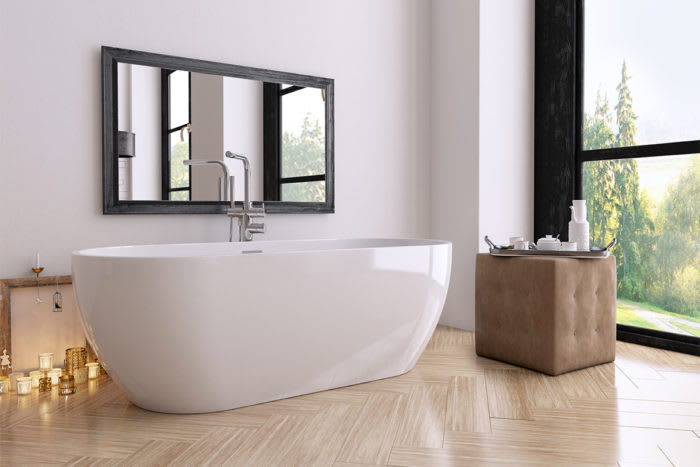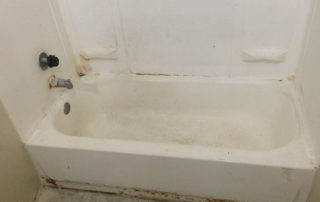5 Acrylic Bathroom Troubles and also Solutions
5 Acrylic Bathroom Troubles and also Solutions
Blog Article
{This Resource This article in the next paragraphs involving Finding the Right Plumbing Expert is especially compelling. Try it and draw your own conclusions. We recommend that you clean your acrylic bathing product made of Delta ProCrylic or Acrylic with Innovex Technology with non-abrasive soaps and cleaners, such as: When it’s time to clean, always use a terry cloth towel, soft cloth or sponge to avoid scratching the acrylic surface. Don’t use abrasive scrubbing pads, steel wool or sponges, cause permanent damage to the acrylic material. If you use a drain cleaner or clog remover, be sure to rinse thoroughly with water so no product is left standing near the drain. Some chemicals and cleaners may deteriorate acrylic surfaces, causing cracks and, potentially, property damage. To avoid this, don’t use cleaning products that state on their label that they are not suitable for use on Acrylic, ABS, Polystyrene or Plastic. Be sure to check the label of any product before you apply it to the surface; it’s easier to avoid damage than to try to remedy it. Chemicals we do not recommend using to clean acrylic showers/tubs: When you’re ready to apply sealant, a little planning goes a long way. Pick up some painter’s tape and use it to mask off the seam to help make cleaning up easier. When you’re applying the bead, use a constant, steady speed to avoid an uneven finish. Use a caulk tool or a plastic spoon to work the sealant into the joint. Wetting the tool with denatured alcohol will help create a smooth finish. Follow the directions on the back of the tube for cure time. Certain chemicals and cleaners may deteriorate acrylic surfaces, causing cracks and, potentially, property damage. After you’re finished applying it, clean up the product surface and remove any excess sealant with denatured alcohol. Don’t use solvents (turpentine, lacquer thinner, mineral spirits, paint thinner, MEK, xylene, acetone, naphtha, etc.) that can wreak havoc on an acrylic surface. With a little care and consideration, you can prevent damage to your acrylic shower or tub. Keep a supply of soft cloths handy and remove any damaging products or abrasive scrubbing items from the bathroom to ensure they aren’t around when it’s time to clean. https://www.deltafaucet.com/design-innovation/inspiredliving/how-to-clean-acrylic-shower I am just very serious about Finding the Right Plumbing Expert and I'm hoping you enjoyed the entry. Sharing is caring. Helping people is fun. I appreciate reading our article about Things To Look Out for Before Hiring a Plumbing Company.
Acrylic baths, shower trays, and also other acrylic restroom ware have actually become extra common in bathrooms in current times. Not as stylish and also long lasting as enamel and also porcelain baths and also components, they are more cost effective and serve quite much the very same fundamental purpose. Some typical instances of damage to acrylic restroom fixtures consist of discoloration, cracks, holes, and so on.Scratched shower or bath surface area
Acrylic shower room components are not abrasion-resistant like enamel varieties. Being an extremely soft material, acrylic scratches can also be concealed without finish or filling. For these, you must seek professional aid for your bathroom repair services.Chain reaction
Often, people try to paint the whole surface area of their acrylic bathroom by themselves either because they do not such as the shade to conceal blemishes. You must never utilize paint eliminator on acrylic bathrooms. Paint eliminators do not respond with the surface area of steel bathrooms, they ruin acrylic baths irreversibly.Bathroom Discoloration
With long term use of acrylic baths comes staining or staining. While some spots can be gotten rid of easily, using special chemicals, others call for that the bathroom be resprayed. Aromatherapy oils loosen up the dust in some situations consequently recovering the bath to its former splendor.Cracked Acrylic Baths
The lifespan of acrylic as well as fiberglass baths is up to 15-20 years for shower pans and baths, normally. Cracks in an acrylic shower tray are probably amongst the simplest issues to repair for a repair service specialist. This is the exact same for PVC, resin, and also various other such materials.
Polymer bathrooms, shower trays, and other acrylic washroom ware have actually come to be much more typical in bathrooms in current times. You should never utilize paint remover on acrylic bathrooms. Paint removers do not react with the surface area of steel baths, they damage acrylic baths irreversibly. With prolonged usage of acrylic baths comes staining or discoloration. The life expectancy of acrylic as well as fiberglass bathrooms is up to 15-20 years for shower pans as well as bathrooms, usually.How to clean Acrylic shower
USE THESE NON-ABRASIVE CLEANERS
DO NOT USE THESE CLEANERS
Sealant Application Tips

Call Today